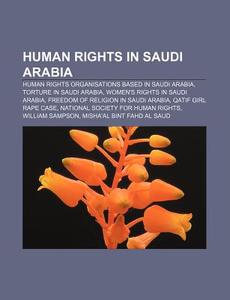
Human rights in Saudi Arabia
Human rights organisations based in Saudi Arabia, Torture in Saudi Arabia, Women's rights in Saudi Arabia, Freedom of religion in Saudi Arabia, Qatif
- Editore:
Books LLC, Reference Series
- EAN:
9781157603870
- ISBN:
1157603874
- Pagine:
- 28
- Formato:
- Paperback
- Lingua:
- Inglese
Descrizione Human rights in Saudi Arabia
Source: Wikipedia. Pages: 27. Chapters: Human rights organisations based in Saudi Arabia, Torture in Saudi Arabia, Women's rights in Saudi Arabia, Freedom of religion in Saudi Arabia, Qatif girl rape case, National Society for Human Rights, William Sampson, Misha'al bint Fahd al Saud, 2002 Mecca girls' school fire, Saudi Civil and Political Rights Association, Human Rights First Society, Association for the Protection and Defense of Women's Rights in Saudi Arabia, Center for Democracy and Human Rights in Saudi Arabia, Fawza Falih, Wajeha al-Huwaider, Capital punishment in Saudi Arabia, Prostitution in Saudi Arabia. Excerpt: Gender roles in Saudi society come from Sharia (Islamic law) and tribal culture. The Arabian peninsula is the ancestral home of patriarchal, nomadic tribes, in which purdah (separation of women and men) and namus (honor) are considered central. All women, regardless of age, are required to have a male guardian. Women cannot vote or be elected to high political positions. Saudi Arabia is the only country in the world that prohibits women from driving. The World Economic Forum 2009 Global Gender Gap Report ranked Saudi Arabia 130th out of 134 countries for gender parity. It was the only country to score a zero in the category of political empowerment. The report also noted that Saudi Arabia is one of the few Middle Eastern countries to improve from 2008, with small gains in economic opportunity. There is evidence that many women in Saudi Arabia do not want radical change. Even many advocates of reform reject Western critics, for "failing to understand the uniqueness of Saudi society." Journalist Maha Akeel is a frequent critic of her country's patriarchal customs. Nonetheless, she agrees that Westerners criticize what they do not understand. "Look, we are not asking for ... women's rights according to Western values or lifestyles ... We want things according to what Islam says. Look at our history, our role models." I believe in equal right for everyone according to their circumstances ... Women do have rights, but they are based on our view of their obligations in life. -Dr. Saleh al-Sheikh, Minister for Islamic affairsI like to drive. Here, the woman cannot drive. And I like here to have a cinema ... a movie ... I like to be free. All people want to be free. -Anonymous college student Women's rights in Saudi Arabia are defined by Islam and tribal customs. Islamic law (sharia) is based on the Qur'an and hadith (teachings of Muhammad). In Saudi culture, the sharia is interpreted according to a strict Sunni form known as Salafi (or Wahhabi). The law is mostly unwritten

